Nigeria: Tens of Thousands Take to the Streets Against SARS— the Brutal Special Anti-Robbery Police Squad
| revcom.us
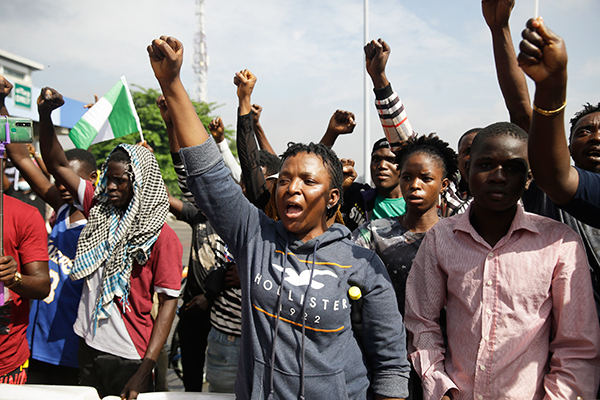 The anti-SARS protests have given voice to other issues like poverty, government corruption, and exploitation by capitalist enterprises. (Photo: AP)
The anti-SARS protests have given voice to other issues like poverty, government corruption, and exploitation by capitalist enterprises. (Photo: AP)
From a reader:
Nigeria has been rocked with protests as tens of thousands have taken to the street demanding an end to “SARS,” the Special Anti-Robbery Squad of the Nigerian police force.
On October 3, a video of SARS shooting a man in broad daylight went viral on social media. Forty-two young Nigerians held a 72-hour protest outside the Lagos State House of Assembly, and this sparked more defiance among the people. Government officials claimed the video was a fake and arrested the person who filmed it—inflaming people’s anger even more.
Demonstrations erupted in Lagos, Nigeria’s biggest city, and in at least 100 other cities around the country. An anti-SARS movement of all kinds of people, fueled by stories and photographs of police brutality on social media, quickly grew. Like how #Black Lives Matter has become a call against police brutality, murder, and systematic injustice, the demand to be treated as EQUAL HUMAN BEINGS is being echoed in Nigeria with the hashtags, #NigerianLivesMatter and #AfricanLivesMatter.
The protesters call themselves the “Soro Soke,” or “speak up” generation in the Yoruba language. And the anti-SARS protests have given voice to other issues like poverty, government corruption, and exploitation by capitalist enterprises.
More than 58 people at the anti-SARS protests in Nigeria are believed to have been killed by cops and soldiers since early October. Vigilante type groups in Nigeria, widely believed to be deployed by the government, have also been attacking protesters with machetes, clubs, and weapons.
On October 12, Nigeria’s president, Muhammadu Buhari, said he was disbanding SARS—a promise that isn’t new. But this did not quell people’s anger, especially when it came out that SARS pigs would be redeployed in police departments throughout the country. The people are demanding SARS pigs be fired and that the most brutal ones be prosecuted.
On October 20, there was a festive atmosphere at a protest encampment in Lagos, with people sharing food and music. A protest leader told the crowd that the police were probably going to come but everything would be OK if they sat down, sang the national anthem, and waved the Nigerian flag. Three hours later security forces fired on protesters. At least 12 peaceful protesters were killed in Lagos that day.
In other cities, riot squads have also been deployed, including in the capital city of Abuja, and protesters have been fired on in a number of cities. But up against such vicious attacks people have not been cowed. In Lagos, people were back in the streets the day after people were killed. A police station was set on fire, people defied a curfew, and roads were blocked.
While many around the world have been watching these events, there are others who don’t know much about Nigeria and in particular aren’t familiar with the kind of struggles being waged by the people there against injustice and oppression. But it is important for people to know about and support the Nigerian people’s struggle against police murder and brutality—which underscores the common interests the masses of people around the world have against the oppressive capitalist system.
What Kind of Country Is Nigeria?
Nigeria is the most populous country in Africa with 206 million people—and more than half the people live in poverty. Like in the U.S. and other countries around the world today, the masses of people in Nigeria confront an oppressive government that has no future for the people, especially the youth. Half of the people are under 19 years old, and the official unemployment rate is 35 percent.
The rulers of Nigeria run an economic and political system that sucks the blood of the people. They don’t act in the interests of the masses and are driven to keep the people down. Nigeria is a neo-colonial country—formally independent but actually subordinate to and dependent on the imperialist world economy. For example, it depends on foreign capital for loans and technology. And Nigeria’s most strategic economic sector, oil and natural gas, is dominated by foreign corporations like Shell, Chevron, and Texaco.
SARS Crimes Against Humanity
SARS, the Special Anti-Robbery Squad in the Nigerian police force, was created in 1992, supposedly to combat violent crime. But like the special SWAT teams formed in the U.S., it became known for carrying out horrendous crimes against the people—with complete impunity.
Why do the people hate SARS? Just between January 2017 and May 2020: At least 82 cases of torture, ill-treatment, and extrajudicial executions. Victims beaten until their bones break, burned with cigarettes, sexual abuse, waterboarding and other kinds of torture, sometimes leading to death. And no SARS pigs ever face punishment for all this, even though Nigeria has an official anti-torture law. The United Kingdom has given SARS training and support.
SARS is known for “profiling” youth, and arresting them for the “crime” of having dreadlocks or tattoos. Many of their victims are poor youth, but SARS also targets men who have expensive phones, laptops, and cars—so they can extort their families, forcing them to pay huge “bail” to get their loved ones out of jail.
And added to all this are hundreds of extrajudicial executions, unlawful killings, and enforced disappearances carried out by “regular” cops and the military each year.
Worldwide Support for the Anti-SARS Struggle
As people around the world have learned about the anti-SARS struggle in Nigeria, there has been an outpouring of support. People are not only sympathetic—but recognize what this is about from experiences in their own countries.
Celebrities, including prominent sports figures and actors in Africa, Europe, and the United States have voiced support for the struggle, including Nigerian international soccer star John Ogu, who called for his teammates to boycott their upcoming game. Other speaking out in support of the struggle: actor John Boyega, Beyoncé, Rihanna, Nicki Minaj, Nigerian singer/rapper Burna Boy, supermodel Naomi Campbell, boxing champion Anthony Joshua, Manchester United soccer player Odion Ighalo, Chance the Rapper, actress Uzo Aduba, Diddy, Drake, actress Gabrielle Union, Trevor Noah, LA Sparks WNBA player Chiney Ogwumike, Indiana Pacers NBA player Victor Oladipo, Miami Heat NBA player Bam Adebayo, and retired NFL player Emmanuel Acho.
These protests against SARS are making an important contribution to the rising upsurge worldwide against crimes carried out against the people by cops, soldiers and vigilantes.
Sources include:
“Why Nigeria Is Now Erupting,” New York Times, October 21, 2020
“Nigerian Forces Fire on Protesters,” Shola Lawal, New York Times, October 22, 2020
“A Dozen Protesters in Nigeria Reported Killed by Security Forces,” New York Times, October 22, 2020
“Chimamanda Ngozi Adichie: Nigeria Is Murdering Its Citizens,” New York Times, October 21, 2020
“Nigeria’s Military Shot and Killed Peaceful Protesters Who Were Calling for an End to Police Brutality,” BuzzFeed, October 22, 2020
“SARS: Why are tens of thousands of Nigerians protesting?” Al Jazeera, October 21, 2020
“Nigeria’s SARS: A brief history of the Special Anti-Robbery Squad,” Sada Malumfashi, Al Jazeera, October 22, 2020
“Why Nigerians Are Protesting Against a Police Force Known as SARS,” Molly Olmstead, Slate, October 21, 2020
“Nigeria: Killing of #EndSARS protesters by the military must be investigated,” Amnesty International, October 21, 2020
“Why Nigerians are protesting police brutality,” Laura Smith-Spark, CNN, October 22, 2020
“End SARS protests: UK police trained ‘brutal’ Nigerian security forces,” Adam Forrest, Independent, October 23, 2020
This speaks volumes.
— 123 (@AbrahamSarki_) October 25, 2020
Over 5,000 people, What if this results in a stampede?
What kind of government do we have?#basedonwhat #NigerianLivesMatter #EndBadGoveranceInNigeria pic.twitter.com/tn7xhFGOHu
Nigeria has been rocked with protests as tens of thousands have taken to the street demanding an end to “SARS”, the Special Anti-Robbery Squad of the Nigerian police force.
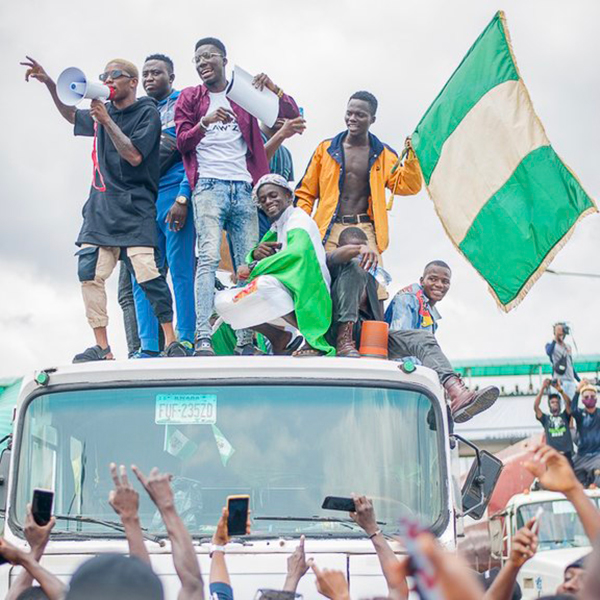 Demonstrations erupted in Lagos, Nigeria’s biggest city, and in at least 100 other cities around the country. (Photo: Wikimedia Commons)
Demonstrations erupted in Lagos, Nigeria’s biggest city, and in at least 100 other cities around the country. (Photo: Wikimedia Commons)
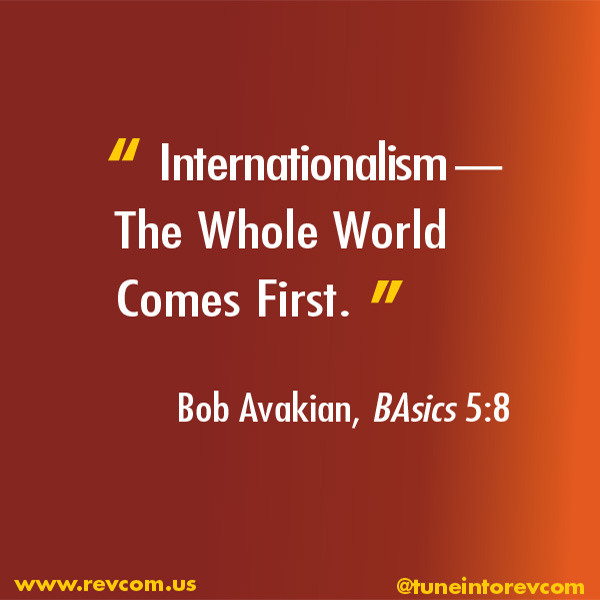
Here's the clearest view I've seen thus far of some of the gunfire at Lekki Toll gate.
— Bertram Hill (@bertram_hill1) October 20, 2020
In this footage, men in camo uniform fire their weapons at: 6.435886, 3.447423, 15m from the East side of the toll gate.
Some of the #EndPoliceBrutalityinNigera protestors had sat down. pic.twitter.com/Vq9iKyAVqt
A protest leader told the crowd that the police were probably going to come but everything would be ok if they sat down, sang the national anthem and waved the Nigerian flag. Three hours later security forces fired on protesters. At least 12 peaceful protesters were killed in Lagos that day.
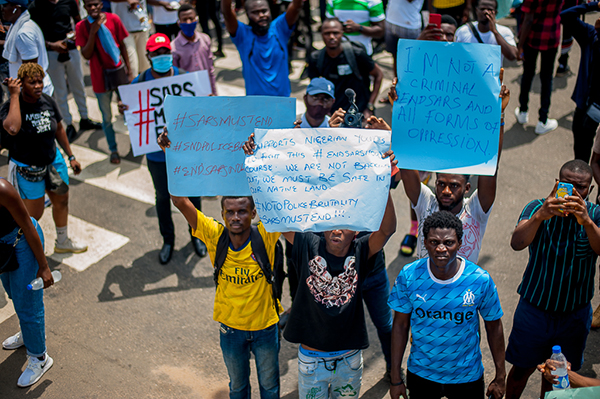 Like how #Black Lives Matter has become a call against police brutality, murder and systematic injustice, the demand to be treated as EQUAL HUMAN BEINGS is being echoed in Nigeria with the hashtags, #NigerianLivesMatter and #AfricanLivesMatter. (Photo: AP)
Like how #Black Lives Matter has become a call against police brutality, murder and systematic injustice, the demand to be treated as EQUAL HUMAN BEINGS is being echoed in Nigeria with the hashtags, #NigerianLivesMatter and #AfricanLivesMatter. (Photo: AP)
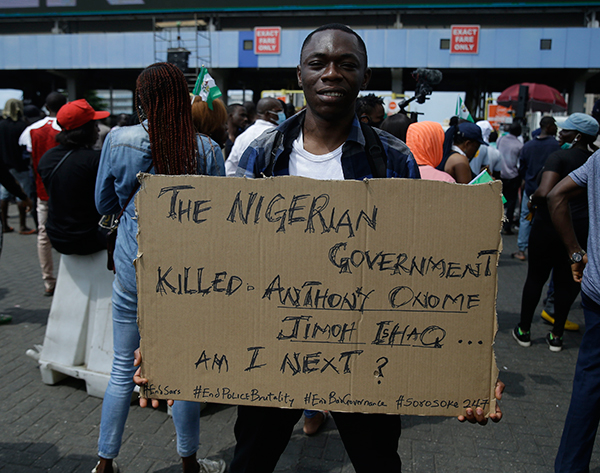 As people around the world have learned about the anti-SARS struggle in Nigeria, there has been an outpouring of support. People are not only sympathetic – but recognize what this is about from experiences in their own countries. (Photo: AP)
As people around the world have learned about the anti-SARS struggle in Nigeria, there has been an outpouring of support. People are not only sympathetic – but recognize what this is about from experiences in their own countries. (Photo: AP)
Get a free email subscription to revcom.us:

